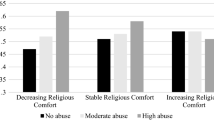Abstract
Based on secondary data from the Thai National Statistical Office, the present study tested a model that links Buddhist practices to self-perceived health in a large sample of Thai people. We tested three hypotheses: (1) Buddhist values (e.g., gratitude, generosity and altruism) arise by how frequently people engage in institutionalized Buddhist practices (e.g., praying, meditation, offering food to the monks); (2) The observation of institutionalized Buddhist practices is linked to higher levels of happiness, improved family and community connections and lower levels of negative emotions, depending on to the extent to which individuals incorporate Buddhist values into their behavior; and (3) The path from Buddhism (practices and values) to self-perceived health is mediated by happiness, negative emotions, and family and community connections. The model had a very good fit with the data, corroborating all hypotheses. The strongest indirect path from Buddhist practices to health was mediated by happiness. The results indicate that religion benefits self-perceived health mediated by how much an individual engages in religious practices and the extent to which those practices nurture human virtues. By regulating negative emotions, promoting family and community connections, and strengthening positive feelings, religion has an indirect impact on health. The implications of these findings for public health and the limitations of the study are discussed.

Similar content being viewed by others
References
Abdel-Khalek, A. M. (2006). Measuring happiness with a single-item scale. Social Behavior and Personality: An International Journal, 34(2), 139–150. https://doi.org/10.2224/sbp.2006.34.2.139.
Bollen, K. A., Biemer, P. P., Karr, A. F., Tueller, S., & Berzofsky, M. E. (2016). Are survey weights needed? A review of diagnostic tests in regression analysis. Annual Review of Statistics and Its Application, 3, 375–392.
Bowling, A. (2005). Just one question: If one question works, why ask several? Journal of Epidemiology and Community Health, 59(5), 342–345. https://doi.org/10.1136/jech.2004.021204.
Chatters, L. M. (2000). Religion and health: Public health research and practice. Annual Review of Public Health, 21(1), 335–367. https://doi.org/10.1146/annurev.publhealth.21.1.335.
Ellison, C. G., & Levin, J. S. (1998). The religion-health connection: Evidence, theory, and future directions. Health Education & Behavior, 25(6), 700–720. https://doi.org/10.1177/109019819802500603.
Eurostat. (2017a). Self-perceived health by sex, age and educational attainment level. Retrieved from: http://appsso.eurostat.ec.europa.eu/nui/show.do?dataset=hlth_silc_02&lang=en. Accessed 30 Dec 2017.
Eurostat. (2017b). Self-perceived health statistics. Retrieved from: http://ec.europa.eu/eurostat/statistics-explained/index.php/Self-perceived_health_statistics. Accessed 30 Dec 2017.
Gray, R. S., Rukumnuaykit, P., Kittisuksathit, S. & Thongthai, V. (2008). Inner happiness among Thai elderly. Journal of Cross Cultural Gerontology, 23, 211–224. https://doi.org/10.1007/s10823-008-9065-7.
Gray, R., Tantipiwatanaskul, P., & Suwannoppakao, R. (2010). Happiness among Thai people: Living a virtuous life, spirituality and self-esteem. Journal of Mental Health of Thailand, 18, 71–85.
Gray, R. S., Hahn, L., Thapsuwan, S., & Thongcharoenchupong, N. (2016). Strength and stress: Positive and negative impacts on caregivers for older adults in Thailand. Australasian Journal on Ageing, 35(2), E7–E12. https://doi.org/10.1111/ajag.12266.
Gelman, A. (2007). Struggles with survey weighting and regression modeling. Statistical Science, 22, 153–164.
George, L. K. (2010). Still happy after all these years: Research frontiers on subjective wellbeing in later life. Journal of Gerontology: Social Sciences, 65B(3), 331–339. https://doi.org/10.1093/geronb/gbq006.
Green, M., & Elliott, M. (2010). Religion, health, and psychological well-being. Journal of Religion and Health, 49(2), 149–163. https://doi.org/10.1007/s10943-009-9242-1.
Hair, J. F., Black, W. C., Babin, B. J., & Anderson, R. E. (2010). Multivariate data analysis. New York, NY: Pearson.
Heeringa, S. G., West, B. T., & Berglund, P. A. (2010). Applied survey data analysis. Boca Raton, FL: Chapman & Hall/CRC Press.
Idler, E. L., & Benyamini, Y. (1997). Self-rated health and mortality: A review of twenty-seven community studies. Journal of Health and Social Behaviour, 38, 21–37.
Koenig, H. (2008). Medicine, religion and health: Where science and spirituality meet. West Conshohocken: Templeton Foundation.
Koenig, H. G. (2012). Religion, spirituality, and health: The research and clinical implications. International Scholarly Research Notices. https://doi.org/10.5402/2012/278730.
Koenig, H., King, D., & Carson, V. B. (2012). Handbook of religion and health. New York, NY: Oxford University Press.
Kramanon, R. & Gray, R. S. (2015). Differentials in happiness among the young old, the middle old and the very old in Thailand. Journal of Population and Social Studies, 23(2), 180–192. https://doi.org/10.14456/jpss.2015.13.
Martikainen, P., Aromaa, A., Heliövaara, M., Klaukka, T., Knekt, P., Jouni Maatela, J., et al. (1999). Reliability of perceived health by sex and age. Social Science and Medicine, 48(8), 1117–1122.
Miller, G., Chen, E., & Cole, S. W. (2009). Health psychology: Developing biologically plausible models linking the social world and physical health. Annual Review of Psychology, 60, 501–524. https://doi.org/10.1146/annurev.psych.60.110707.163551.
Sabatini, F. (2014). The relationship between happiness and health: Evidence from Italy. Social Science and Medicine, 114, 178–187. https://doi.org/10.1016/j.socscimed.2014.05.024.
Schreiber, J. B., Amaury, N., Stage, F. K., Barlow, E. A., & King, J. (2006). Reporting structural equation modeling and confirmatory factor analysis results: A review. Journal of Educational Research, 99, 323–338. https://doi.org/10.3200/JOER.99.6.323-338.
Schuurmans-Stekhoven, J. B. (2011). Is it God or just the data that moves in mysterious ways? How well-being research may be mistaking faith for virtue. Social Indicators Research, 100(2), 313–330. https://doi.org/10.1007/s11205-010-9630-7.
Shields, M., & Shooshtari, S. (2001). Determinants of self-perceived health. Health Reports, 13(1), 35–52. Retrieved from: http://www.statcan.gc.ca/pub/82-003-x/2001001/article/6023-eng.pdf.
Slocum, S. L. (2005). Assessing unidimensionality of psychological scales: Using individual and integrative criteria from factor analysis. Doctoral Dissertation, University of British Columbia, Canada. https://open.library.ubc.ca/cIRcle/collections/ubctheses/831/items/1.0054414.
Thai National Statistical Office. (2010). The 2010 Population and Housing Census (Whole Kingdom): Executive summary. Retrieved from: http://popcensus.nso.go.th/file/popcensus-10-01-56-E.pdf. Accessed 30 Dec 2017.
Zwingmann, C., Klein, C., & Büssing, A. (2011). Measuring religiosity/spirituality: Theoretical differentiations and categorization of instruments. Religions, 2(3), 345–357. https://doi.org/10.3390/rel2030345.
Acknowledgements
This research was funded by the Thai Health Promotion Foundation. The authors gratefully acknowledge the support of Dr. Prawate Tantipiwatanaskul, the manager of Mental Health Project in Thailand.
Author information
Authors and Affiliations
Corresponding author
Ethics declarations
Conflict of interest
The authors declare that they have no conflict of interest.
Rights and permissions
About this article
Cite this article
Winzer, L., Gray, R.S. The Role of Buddhist Practices in Happiness and Health in Thailand: A Structural Equation Model. J Happiness Stud 20, 411–425 (2019). https://doi.org/10.1007/s10902-017-9953-z
Published:
Issue Date:
DOI: https://doi.org/10.1007/s10902-017-9953-z




